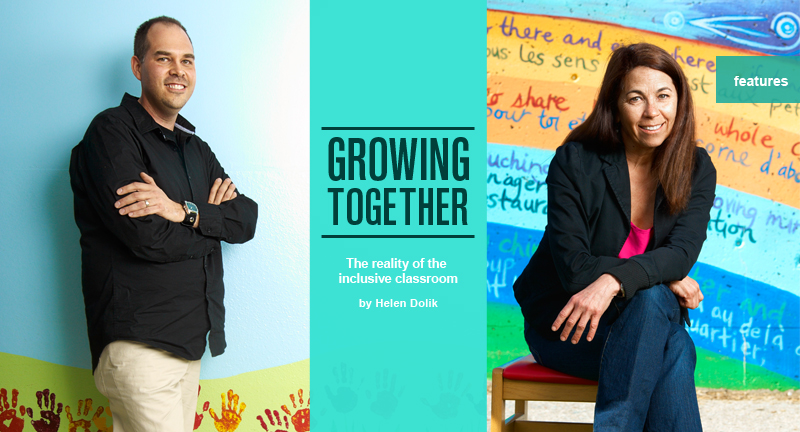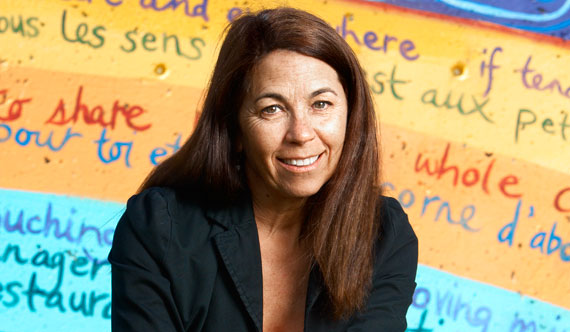
WHILE ENROLLED IN THE NEW Inclusive Classroom Additional Qualification course, Sean Gale, OCT, developed a project that allowed his young students to create their own inclusive community. They named it Peacewood.
Gale’s class at Elizabeth Simcoe Junior Public School in Scarborough spent several weeks reading and talking about different types of families, such as blended, same-sex, nuclear and adopted. They discussed townhouses, high-rise buildings, bungalows and businesses. Students were instructed to think about creating a community that would encourage and include a diverse complement of people.
The Grades 1 and 2 students then built miniature structures they felt would support the needs of inclusive communities. Some constructed places of worship, such as a church, a mosque and a synagogue. One student created a movie theatre with a rooftop garden for growing organic produce to be sold at the snack bar. Another student built a community centre equipped with lifts and ramps for wheelchairs and motorized scooters. Each student then created a family and a home for the community, and all structures were glued on cardboard. The students presented Peacewood to their own families at a special reception.
Teachers learn how to create equitable, just, safe and accepting classrooms.
“Not only did the students see themselves within the families they created, they also developed awareness about families that differed from what was familiar to them, and they appreciated the role diversity plays in the larger community,” says Gale, who now teaches a blended Grade 1/2 class at Ionview Public School in Scarborough. “Creating the inclusive communities with my class contributed largely to me being awarded the Elementary Teachers of Toronto Excellence in Teaching Equity Award last year. The desire and enthusiasm for putting together this unit would not have happened without the knowledge I acquired through the Inclusive Classroom AQ course." Gale took Inclusive Classroom Part 1 in 2011 and plans to go on to Part 2 later this year.
Inclusive Classroom is a new three-session Additional Qualification that resulted from the review of the Teachers’ Qualifications Regulation. Since its launch in August 2009, about 50 Inclusive Classroom AQs have been awarded to teachers. This AQ supports the ongoing enhancement of a teacher’s professional knowledge, skills and practices related to creating the most inclusive educational environments for students in diverse Ontario. It aligns with Ministry of Education policies on equity and diversity.
“Teachers will learn how to create equitable, just, safe and accepting learning communities within classrooms and schools,” says Déirdre Smith, OCT, manager of the College’s Standards of Practice and Education unit. “They will explore various ways to include student needs, culture, traditions and lived experiences into all aspects of learning.”

We all need to find ways of being accepting of everyone, says French Immersion teacher Lisa Guthro, OCT.
Lisa Guthro, OCT, who teaches primary French Immersion at Owen Public School in North York, took the course in the summer of 2011. “Toronto is increasingly multicultural, so we all need to find ways to be accepting of everyone,” she says. “I also believe that Inclusive Classroom is future oriented. The course started with the inner self, with opportunities for self-reflection, and moved out to the classroom, school and greater community. This AQ is progressive and current, so it was quite refreshing and stimulating.”
There really is an AQ for you
Teachers give high marks to ongoing professional learning — that’s what College statistics show.
In 2011 the College awarded 41,480 Additional Qualifications to its members. The most popular AQ course was Special Education. Teachers also favour English as a Second Language, Reading, Religious Education and Kindergarten.
Teachers looking to solidify or enhance their professional practice gravitate to AQ courses, and there are plenty to choose from, with 368 courses each in English and French. AQ courses are offered by 36 providers across Ontario. Currently, the College is meeting with several First Nations communities interested in becoming providers.
Ongoing learning provides opportunities to share thoughts and ideas with other teachers, who may be in different stages of their careers or in other parts of the province.
“AQ courses are the crown jewels of self-regulation,” says Sharon Young Kipp, OCT, chair of the College’s Standards of Practice and Education Committee. “Often, people do not make the connection between the College and the hundreds of AQ courses that are available." Young Kipp adds that the courses are developed in partnership with stakeholders and members of the College.
"They are delivered by teachers, for teachers," she says. "These courses support both teacher excellence and professional growth.
"AQ courses open the door to new responsibilities and leadership opportunities.”
The College’s online search tool, Find an AQ, helps teachers find a course and provider to suit specific needs or interests. Access Find an AQ directly from the College’s main page at oct.ca.